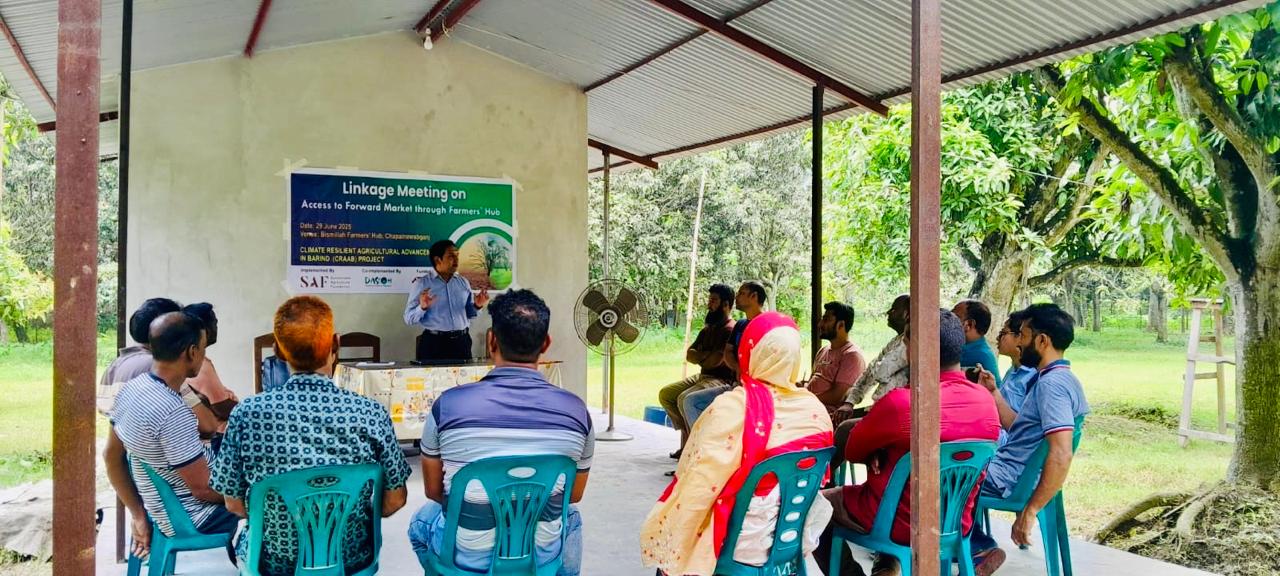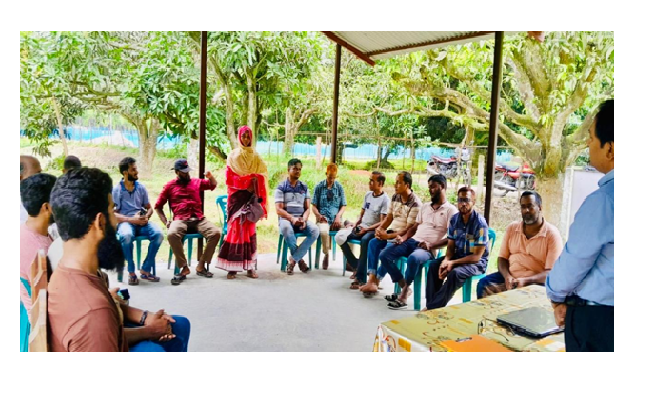

TBT DESK, Rajshahi: A pivotal Forward Market Linkage Meeting was held today (June 29, 2025) in Chapainawabganj, bringing together Farmers’ Hub owners and prominent domestic and international mango traders. This strategic initiative, led by the Climate Resilient Agricultural Advancement in Barind (CRAAB) project, aims to create direct market access for farmers, ensuring fair pricing and reducing dependence on intermediaries.
Funded by HSBC and implemented by the Sustainable Agriculture Foundation (SAF) Bangladesh in partnership with DASCOH Foundation, the CRAAB project is committed to enhancing climate resilience and income opportunities for smallholder farmers across the Barind region.
The core objective of the meeting was to facilitate direct engagement between mango producers organized through Farmers’ Hubs and large-scale buyers, including exporters, wholesalers, and online vendors. This move is expected to secure fair prices for farmers, improve supply chain efficiency, and promote long-term business relationships.
During the event, Farmers’ Hub owners shared practical experiences and challenges in mango cultivation, aggregation, preservation, and primary processing. They emphasized the need for stable market access amidst concerns such as erratic weather patterns, pest outbreaks, price volatility, and transportation constraints.
Md. Atikur Rahman (Atik) from Bismillah Farmers’ Hub expressed enthusiasm about the new market linkage:

“This meeting has created an opportunity for us to operate without middlemen. We can buy mangoes directly from our farmers at fair prices and sell to national and international traders and online platforms. It reduces risk, saves time and transportation costs for farmers, and ensures a more sustainable income for our business.”
Several other Hub owners echoed similar sentiments, highlighting that forward marketing models could enable year-round income and attract new enterprises into the value chain.
On the buyers' side, participating traders underscored the importance of consistent quality, timely collection, proper packaging, and robust logistics. They expressed strong interest in sourcing mangoes directly from the Farmers’ Hubs, citing the benefits of time and cost savings.
Md. Asadul Al Mahmud (Biplob), a mango exporter, remarked:
“If the quality is maintained, we are ready to procure mangoes directly from the Hubs. It streamlines our operations and enhances traceability.”
Similarly, Md. Asik of Gram Bangla Store and Mohammad Ali, a national-level wholesaler, both affirmed their willingness to engage in sustained purchasing relationships, contingent on product quality and operational consistency.
The meeting concluded with consensus on several key action points:
• Establishment of direct communication channels between Farmers’ Hubs and traders.
• Verbal agreements with six Farmers’ Hubs for initial procurement.
• Commitments to explore larger-scale commercial partnerships in the next mango season.
Recommendations and Next Steps:
A presentation by SAF Bangladesh highlighted the progress of the Farmers’ Hubs, including their capacity, outreach to local producers, and contribution to market development. Participants agreed on the importance of adopting fair pricing mechanisms, accurate weighing practices, and digital transaction systems to build long-term business trust.
This forward market linkage initiative marks a significant step toward building a more inclusive, efficient, and climate-resilient agricultural value chain in the Barind region.
